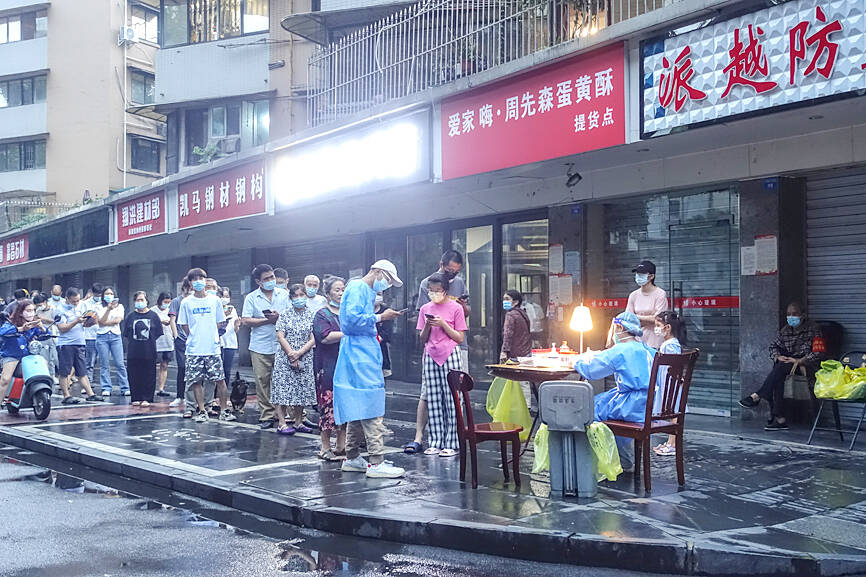China extended a lockdown in districts of Chengdu and ordered more mass testing as it tries to contain a COVID-19 outbreak.
Chengdu’s central Jinjiang District would intensify lockdown measures and extend them for at least three days, authorities said in a statement yesterday.
Other districts announced a third round of COVID-19 tests.

Photo: EPA-EFE
People should return home without delay after being tested, officials said.
Chengdu’s lockdown, which started on Thursday, demonstrates the country’s commitment to its “zero COVID-19” approach despite the economic loss it has triggered.
Chengdu, China’s sixth-largest city, is the biggest to be closed off since Shanghai on June 1 ended two months of curbs on people’s movement, the effects of which are still being felt by businesses.
Demand in Shanghai for everything from restaurant dining to movies and tourism are still far below pre-lockdown levels, while some indicators show that the city is taking longer to recover than Hong Kong, where rules have been eased.
Retail sales in the city dropped 4.3 percent in June from a year earlier and rose a meager 0.3 percent in July, following an average 35 percent slump in the preceding three months starting March, when the outbreak began.
China on Saturday reported 1,673 local COVID-19 cases in total, including 1,359 asymptomatic cases.
Tibet found the most cases among all regions, with 556 new infections detected, Chinese National Health Commission data showed.
Sichuan Province, home to Chengdu, reported 186 cases, while southern technology hub Shenzhen reported 89 new cases.
Daily new infections in the coming few days are expected to remain at elevated levels, local health authorities said at a Saturday news briefing.
Beijing and Shanghai found only one case each.
Tianjin, a northern port hub near Beijing, shut dine-in services in one district after finding 22 new cases on Saturday. The city started mass testing its 13.7 million residents from yesterday.
Sichuan’s Aba County, home to about 815,000 people, yesterday implemented a lockdown, with local authorties saying that the restrictions would last for at least four days.

DOUBLE-MURDER CASE: The officer told the dispatcher he would check the locations of the callers, but instead headed to a pizzeria, remaining there for about an hour A New Jersey officer has been charged with misconduct after prosecutors said he did not quickly respond to and properly investigate reports of a shooting that turned out to be a double murder, instead allegedly stopping at an ATM and pizzeria. Franklin Township Police Sergeant Kevin Bollaro was the on-duty officer on the evening of Aug. 1, when police received 911 calls reporting gunshots and screaming in Pittstown, about 96km from Manhattan in central New Jersey, Hunterdon County Prosecutor Renee Robeson’s office said. However, rather than responding immediately, prosecutors said GPS data and surveillance video showed Bollaro drove about 3km

‘MOTHER’ OF THAILAND: In her glamorous heyday in the 1960s, former Thai queen Sirikit mingled with US presidents and superstars such as Elvis Presley The year-long funeral ceremony of former Thai queen Sirikit started yesterday, with grieving royalists set to salute the procession bringing her body to lie in state at Bangkok’s Grand Palace. Members of the royal family are venerated in Thailand, treated by many as semi-divine figures, and lavished with glowing media coverage and gold-adorned portraits hanging in public spaces and private homes nationwide. Sirikit, the mother of Thai King Vajiralongkorn and widow of the nation’s longest-reigning monarch, died late on Friday at the age of 93. Black-and-white tributes to the royal matriarch are being beamed onto towering digital advertizing billboards, on

Tens of thousands of people on Saturday took to the streets of Spain’s eastern city of Valencia to mark the first anniversary of floods that killed 229 people and to denounce the handling of the disaster. Demonstrators, many carrying photos of the victims, called on regional government head Carlos Mazon to resign over what they said was the slow response to one of Europe’s deadliest natural disasters in decades. “People are still really angry,” said Rosa Cerros, a 42-year-old government worker who took part with her husband and two young daughters. “Why weren’t people evacuated? Its incomprehensible,” she said. Mazon’s

POWER ABUSE WORRY: Some people warned that the broad language of the treaty could lead to overreach by authorities and enable the repression of government critics Countries signed their first UN treaty targeting cybercrime in Hanoi yesterday, despite opposition from an unlikely band of tech companies and rights groups warning of expanded state surveillance. The new global legal framework aims to bolster international cooperation to fight digital crimes, from child pornography to transnational cyberscams and money laundering. More than 60 countries signed the declaration, which means it would go into force once ratified by those states. UN Secretary-General Antonio Guterres described the signing as an “important milestone,” and that it was “only the beginning.” “Every day, sophisticated scams destroy families, steal migrants and drain billions of dollars from our economy...